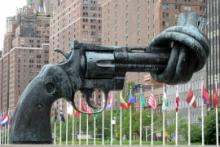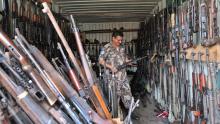arms

IN 1988, a bronze sculpture of Carl Fredrik Reuterswärd’s knotted gun was placed outside the United Nations headquarters in New York. As Kofi Annan, former U.N. secretary general and Nobel Peace laureate, remarked at its unveiling, the sculpture isn’t just a cherished piece of art, but a powerful symbol that encapsulates in a few simple curves the greatest prayer of humanity: not for victory, but for peace.
Inside the U.N. building is a mosaic representing all the nations of the Earth, accompanied by Jesus’ words, “Do unto others what you would have others do unto you.” For many seasoned peace campaigners, myself included, this prayer was partly answered when the 193-nation U.N. General Assembly overwhelmingly approved the Arms Trade Treaty in April.
The treaty seeks to regulate the international trade in conventional arms, from small arms to tanks, combat aircraft, and warships. It aims to foster peace and security by putting a stop to the destabilizing flow of arms to conflict regions. This process cannot, however, be only a matter of negotiation and numbers. What needs to undergird the treaty is protecting humans, made in God’s image. What needs to motivate the treaty is ensuring the possibility of what philosopher Hans Jonas called “the permanence of an authentically human life on Earth.”
The statistics are frightening. Globally, one person dies every minute from armed violence. This treaty will help halt the uncontrolled flow of arms and ammunition that fuels wars, atrocities, and rights abuses. The devastating humanitarian consequences of the two-year war in Syria, a war fueled in part by the irresponsible export of arms, underline just how urgently this treaty is needed.

PRESSURE IS BUILDING for the United States to become militarily involved in the Syrian civil war. The result would be further bloodshed and destruction for the people of Syria, the worsening of an already grave regional security crisis, and U.S. involvement in another Middle East war.
The Obama administration has apparently decided to provide arms to the rebels. Sen. John McCain and others in Congress are calling for a no-fly zone and air strikes against Syrian government targets. The increased hard line comes in response to allegations that Syrian government forces have used chemical weapons, crossing the “red line” President Obama warned against—although reports have surfaced that rebel forces also may have used chemical weapons.
Concerns about the use of chemical weapons are serious, but they are not a justification for military action that could drag U.S. forces into the deadly civil conflict. Bombing strikes would not be sufficient to neutralize Syria’s vast arsenal of chemical weapons, and they could cause chemical explosions that would release the deadly toxins we seek to contain.
For a military operation to achieve results, it would have to be a large-scale undertaking. Creating a humanitarian safe zone or attempting to impose a no-fly zone would require a major commitment of allied forces and would lead to serious military confrontation with hostile Syrian forces.

There’s a famous maxim that says, “The only thing necessary for the triumph of evil is for good men to do nothing.” Though Wikipedia says otherwise, the statement is often attributed to Edmund Burke.
I doubt that Wikipedia will give me the credit for this 200 years from now, but I’d like to take a crack at a counterpoint to Burke’s famous maxim anyway: Sometimes evil triumphs not when good people do nothing, but when good people fail to distinguish between hypothetical evil and real evil, and end up doing something about the former when they should be doing something about the latter.
Case in point: National Conservative Christian radio host Kerby Anderson’s attempt to rally his followers to thwart the Senate from ratifying the Arms Trade Treaty.